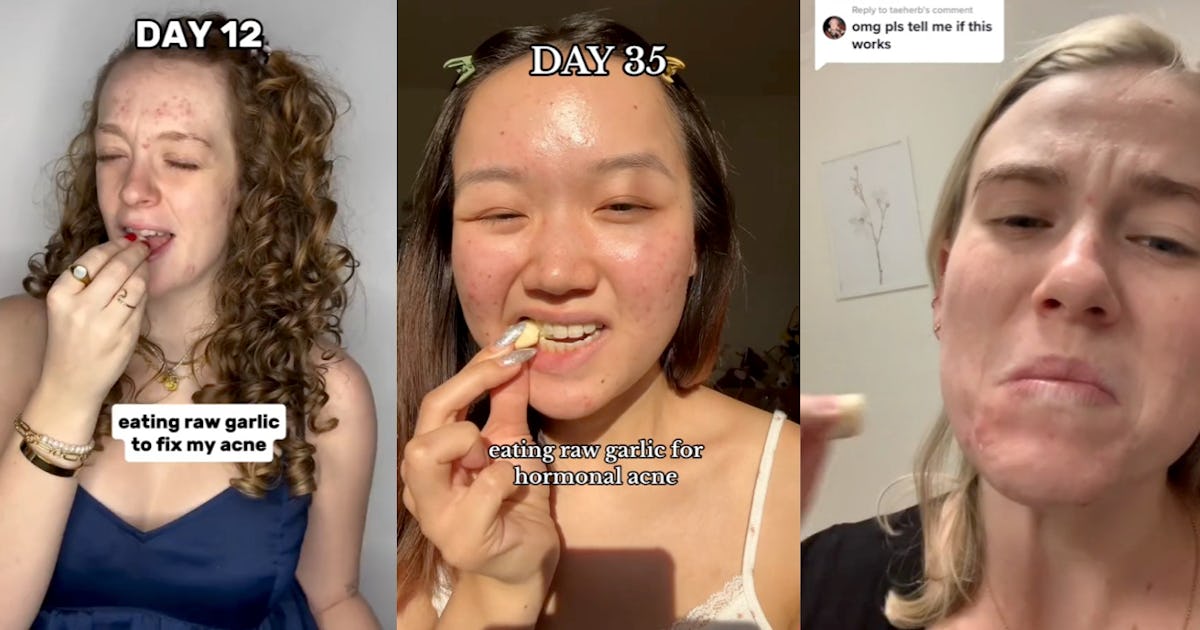Another day, another TikTok skin hack. This time, instead of drinking clove water each day to magically tighten up your downstairs (no, that’s not a joke), content creators are suggesting that you eat a clove of raw garlic daily to combat hormonal acne. In some cases, they even suggest rubbing the garlic directly on an active pimple as a natural spot treatment (while admitting that it burns really badly). When it comes to garlic for acne, and whether eating garlic can clear your skin, dermatologists say there’s not much research to confirm it’ll help, but some definite reasons not to rub a garlic clove right on your newest zit.
Garlic is known to have anti-inflammatory and antibacterial properties, both of which obviously sound beneficial when you need to heal breakouts. One study found that topical gels containing garlic extract did have antibacterial effects when applied to the skin, but still found that the topical antibiotic clindamycin was more effective. In another investigation on garlic’s uses in skin health, study participants did have some adverse reactions to putting garlic extract on their skin, including contact dermatitis and even some blistering rashes. Dr. Kate Jameson, cosmetic physician and medical director of Youth Lab Australia, says she’s concerned about this trend spreading online, specifically because of the risks of rubbing raw garlic onto the skin.
“Garlic can cause significant irritation, allergic reactions, and even chemical burns, which may result in post-inflammatory pigmentation,” Jameson says. She emphasizes that there is minimal scientific backing to support its efficacy in treating acne, which makes the risks even less worth it. “It’s always best to rely on proven, safe treatments for acne rather than taking risks with your skin. It’s crucial to address acne at its source, rather than relying on unproven remedies that could lead to long-term skin issues such as scarring.”
If rubbing garlic on your breakouts gets a big fat “no” from skin health experts, what about eating a clove daily? Some folks on TikTok recommend marinating the cloves in honey, so that when you eat them, you get all the benefits of honey’s antibacterial power, too.
“Garlic and honey may have mild anti-inflammatory and antimicrobial benefits but there’s no strong evidence that they clear acne. Acne has multiple causes and often requires targeted treatments. Adding garlic and honey to your diet may promote overall health, but will not give you noticeable skin improvements,” Jameson says.
In a video posted to her Instagram which references the TikTok above, board-certified dermatologist Dr. Shereene Idriss said that eating garlic to treat hormonal acne specifically is “a guaranteed fail.”
“Hormonal acne is due to a hormone imbalance where your androgens, i.e. your testosterone… are overly active. Instead of trying to reinvent the wheel and getting scarred in the process, let’s go to things that we know work.” She went on to explain some of the proven treatments for hormonal acne, like spironolactone, birth control, or a new topical cream called Winlevi.
“When conventional treatments don’t work, natural remedies feel convenient, safe, and in your control,” Jameson adds. “Viral trends and personal success stories make them attractive, even with no evidence. Cultural and historical associations with natural ingredients make them believable for those looking for alternatives, but just because an ingredient is natural, it doesn’t mean that it can’t be harmful for your skin.”
Instead of trying garlic as a spot treatment or eating a clove a day, Jameson promotes a gentle skincare routine and washing your hair regularly to help manage acne — that, and approaching social media skincare trends with caution.

